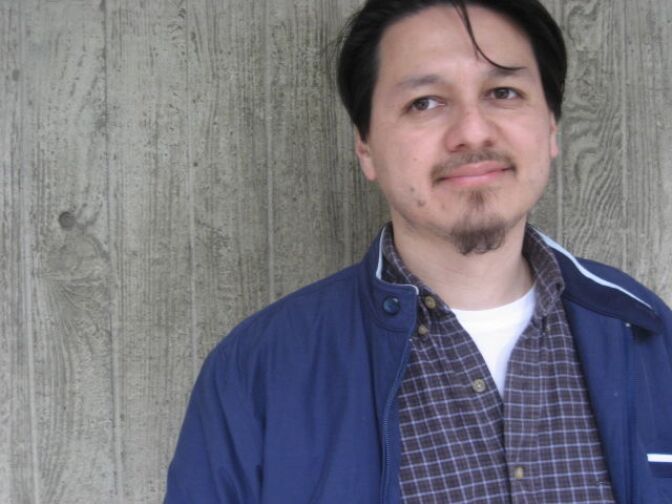This story is free to read because readers choose to support LAist. If you find value in independent local reporting, make a donation to power our newsroom today.
This archival content was originally written for and published on KPCC.org. Keep in mind that links and images may no longer work — and references may be outdated.
Salvadoran American's poetry makes amends for silence over civil war

Many of Southern California’s Salvadoran immigrants arrived about three decades ago, driven here by a bloody civil war in El Salvador between leftist guerrillas and the country’s U.S.-supported right-wing government. Poet William Archila is one of a handful of Salvadoran American writers beginning to document his compatriots’ immigrant experience.
The oldest Salvadoran cultural center in L.A. is Casa de Cultura de El Salvador. It’s in a fifth-floor office at the La Curacao department store in the Pico Union neighborhood. Founder Dagoberto Reyes, a 65 year-old sculptor who belonged to a guerrilla group in El Salvador before he escaped three decades ago, browses through Salvadoran novels on a packed bookshelf.
The country’s blue and white flag is taped to a bookshelf nearby.
He complains that the work of most Salvadoran writers in the United States is disconnected from the immigrant experience. Reyes is waiting for young Salvadoran American writers to document the highs and lows of that nationality’s experience in this country. "I think that there's little of any of that kind of narrative," he said.
Los Angeles writer William Archila does that in his new collection of poetry. In 1980, Archila arrived in Los Angeles with his family, escaping the violence in the large Salvadoran city of Santa Ana.
"I think what affected me the most was seeing my own school mates dead on the street or my own teammates from a soccer team dead the next morning or neighbors that you had built a relationship for years then one day, just like that, gone," Archila said.
Since he left El Salvador, Archila’s felt like a stranger in a strange land. That’s why he titled his book “The Art of Exile.”
"When I came to this country I think I, I just found myself, going numb, I remember shutting myself down a lot and just going through the motions, ‘this is what I have to do,” I have to learn this language, I have to learn this culture, I have to succeed, I have to go on and continue, what we have here is better than what we have there," he said.
He also felt like a stranger when he returned to El Salvador 18 years ago to visit his family.
"I tried to talk to them and when I tried to I felt, I hesitated because, my tongue seemed cut up, tied or something, I really couldn’t find that rhythm again," Archila said.
In L.A., Salvadoran adults kept silent about the warfare that tore apart their homeland. Archila says he’s making amends through his poetry.
His parents encouraged him to pursue an advanced education. In college the works of Walt Whitman and James Joyce cracked open a door that revealed to him the power of literature. Archila is a high school English teacher at Belmont High School.
"When I think of the Central Americans who were coming to this country back in the '80s, and compare them to the Central American students coming to the classroom today, I notice that there is a lack of motivation," Archila said, "that there is a sense of no hope."
That doesn’t mean he’s given up hope. To him, it means that the young people who feel like strangers in a strange land, as he did 30 years ago, may need help even more than he did.








